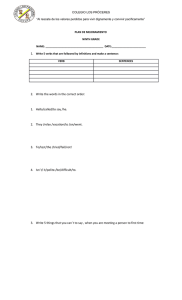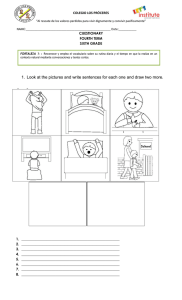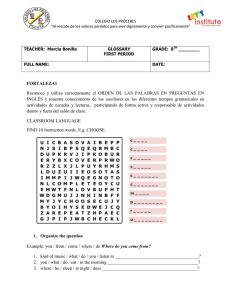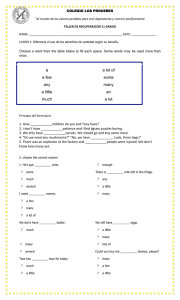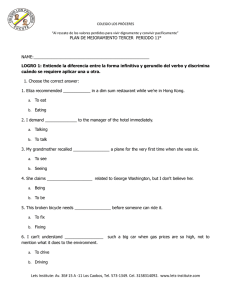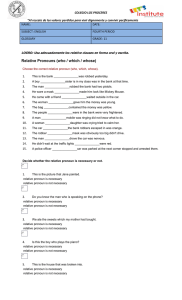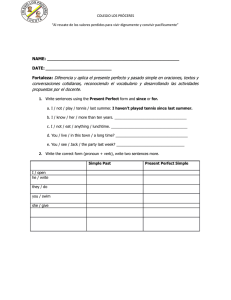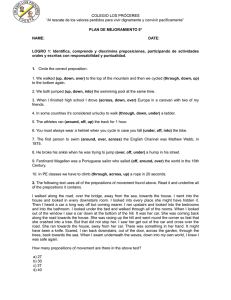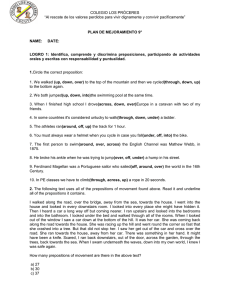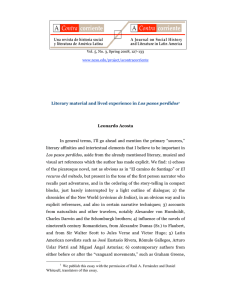remember - WebColegios
Anuncio
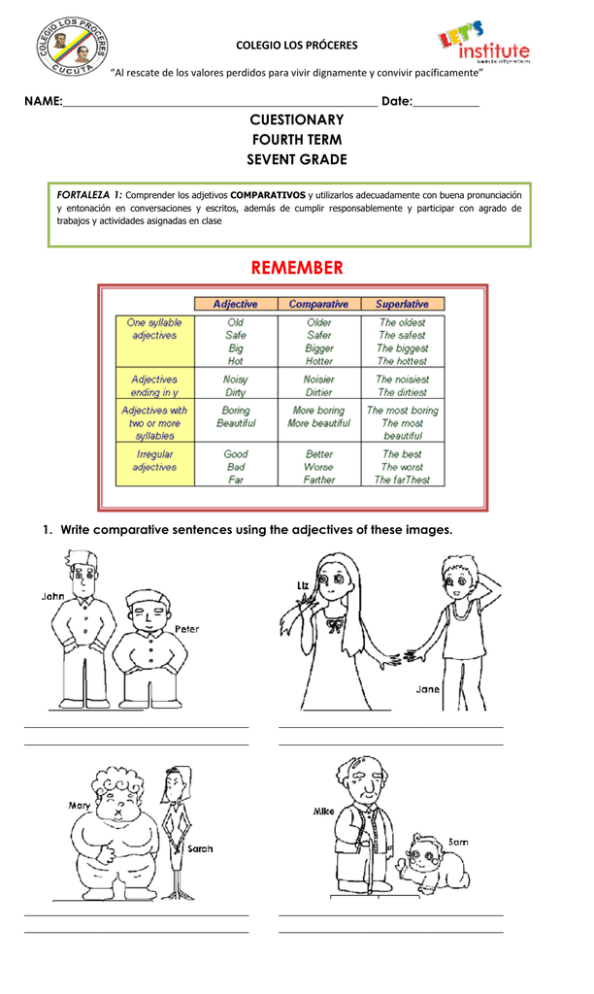
COLEGIO LOS PRÓCERES “Al rescate de los valores perdidos para vivir dignamente y convivir pacíficamente” NAME:____________________________________________________ Date:___________ CUESTIONARY FOURTH TERM SEVENT GRADE FORTALEZA 1: Comprender los adjetivos COMPARATIVOS y utilizarlos adecuadamente con buena pronunciación y entonación en conversaciones y escritos, además de cumplir responsablemente y participar con agrado de trabajos y actividades asignadas en clase REMEMBER 1. Write comparative sentences using the adjectives of these images. _____________________________________ _____________________________________ _____________________________________ _____________________________________ _____________________________________ _____________________________________ _____________________________________ _____________________________________ COLEGIO LOS PRÓCERES “Al rescate de los valores perdidos para vivir dignamente y convivir pacíficamente” FORTALEZA 2: Comprender los adjetivos SUPERLATIVOS y utilizarlos adecuadamente con buena pronunciación y entonación en conversaciones y escritos, además de cumplir responsablemente y participar con agrado de trabajos y actividades asignadas en clase 2. Look at the picture, and complete the sentences. Next write if they are superlative(S) or comparatives(C). 1. Joe is than Ed. (short) ____Joe is shorter than Ed_________________________ ____C___ 2. Al is the . (short) _________________________________________________ _______ 3. Ed is the . (thin _________________________________________________ _______ 4. Joe is than Al. (thin _________________________________________________ _______ 5. Al has the clothes. (colourful) ______________________________________________ _______ 6. Al is than Joe. (heavy) _________________________________________________ _______ ____________________________________________________ _______ 7. Ed is the . (light) 8. Joe is than Ed. (happy) ____________________________________________________ _______ 9. Ed is the . (mysterious) _______ ____________________________________________________ 10. Joe is than Ed. (energetic) ___________________________________________________ ________ FORTALEZA 3: Establecer las diferencias gramaticales entre el uso de “WOULD LIKE + INFINITIVE / LIKE + GERUND” en conversaciones y escritos, cumpliendo responsablemente con trabajos asignados en clase COLEGIO LOS PRÓCERES “Al rescate de los valores perdidos para vivir dignamente y convivir pacíficamente” REMEMBER El verbo like se traduce en castellano por “gustar”. Se utiliza para hablar de actividades que hacemos con regularidad y que disfrutamos haciendo: I like walking in the park. // He likes travelling. El verbo would like se traduce en castellano por “(me/te/le/nos/os/les) gustaría”. También puede ser una manera más formal de decir “want”: I would like a kilo of apples, please.También se utiliza para hablar de planes o de situaciones imaginarias, que no existen en la actualidad: I would like to travel around the world. I would like to study English next year. Uso de would like y like La principal diferencia entre estas dos formas verbales consiste en que like está acompañado por un gerundio, mientras que would like está siempre acompañado por un infinitivo: I like getting up early in the morning. I would like to get up early tomorrow so I can see the sunrise. 3. Look at the images. Write AFFIRMATIVE (+) or NEGATIVE (-) sentences, or QUESTIONS (?). Use would like and a verb. Use a verb from the box BE HAVE 1. HAVE TRAVEL PLAY BE I / Singer + __I would like to be a singer_______________________________ 2. You / Children? ? ____________________________________________________? 3. I / Garden. + ________________________________________________________ 4. I / around the world. + ____________________________________________________ BUY COLEGIO LOS PRÓCERES “Al rescate de los valores perdidos para vivir dignamente y convivir pacíficamente” 5. You / tennis? ? ____________________________________________________? 6. I / A teacher -____________________________________________________ 7. We /a new car + _____________________________________________________ FORTALEZA 4: Aplica correctamente la estructura gramatical los adverbios, mostrando comprensión del significado de los mismos, discriminándolos en actividades de lectura REMEMBER Ten cuidado con los adverbios irregulares! 4. Change the adjective to an adverb. a. My uncle will be here ____________ (short) b. My grandfather drives very ______________ (slow) c. Mark drives too ___________(fast) COLEGIO LOS PRÓCERES “Al rescate de los valores perdidos para vivir dignamente y convivir pacíficamente” d. I ______________hate that singer! (real) e. He was _______________reading a magazine. (quiet) f. The band at the bar was playing very __________ (loud) g. Your camera works ______________ (perfect) h. I was _____________happy to see her again. (extreme) i. They worked very _________today. (hard) j. Mary answered all the questions ______________ (correct) 5. Complete each of the following sentences by changing the adjective in brackets into an adverb: 1. Don't drive so _____________! Slow down before you kill us all! (quick) 2. Try not to speak too ______________when you're with Juan. He doesn't understand. (fast) 3. I couldn't hear you very ______________on the phone. The line was bad. (good) 4. Chelsea lost 3-0 because they played _______________. (bad) 5. I never get up ________________at the weekend. (early) 6. We were disappointed with the restaurant. The food was _____________awful. (real) 7. The footballer's performances got _____________better as he got fitter. (steady) 8. Walk _____________- the stairs are wet and slippery. (careful) 9. You shouldn't work so ______. You'll have a heart attack one of these days. (Hard). 10. I've decided to fire Steve Jones. He arrived ____________for the meeting again. (late).
